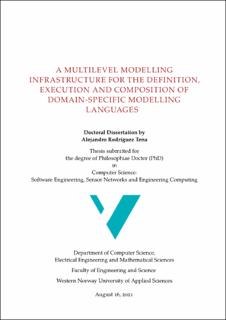| dc.contributor.author | Rodríguez Tena, Alejandro | |
| dc.date.accessioned | 2021-11-19T10:17:23Z | |
| dc.date.available | 2021-11-19T10:17:23Z | |
| dc.date.created | 2021-11-18T11:24:02Z | |
| dc.date.issued | 2021 | |
| dc.identifier.citation | Rodríguez Tena, A. (2021). A multilevel modelling infrastructure for the definition, execution and composition of domain-specific modelling languages [Doctoral dissertation]. Western Norway University of Applied Sciences. | en_US |
| dc.identifier.isbn | 978-82-93677-57-4 | |
| dc.identifier.uri | https://hdl.handle.net/11250/2830454 | |
| dc.description | Articles A and B are © Springer. Reused by permission. | en_US |
| dc.description.abstract | Nowadays software has scaled to a point where it is present in every aspect of our lives. It is paramount to explore techniques that speed up the construction of software and desirably increase the reliability and quality of the final products. In particular, the adoption of software systems to support almost all kinds of tasks for the society has enforced the needs to explore the development of Domain-Specific Modelling Languages (DSMLs) to bridge the gap between clients, domain experts and software engineers. Moreover, the pervasive and concurrent nature of today's software has increased the interest in the behavioural aspects of modelling languages, facilitating the simulation, execution and verification of models prior to their actual implementation to reveal errors and potential misbehaviours. One of the most prominent fields of Model-Driven Software Engineering (MDSE) is the design and implementation of DSMLs. The creation of DSMLs involves the specification of different abstraction levels to distribute the concepts of the domain appropriately. Limitations in MDSE, especially regarding a strict number of available abstraction levels, have motivated the research and application of Multilevel Modelling (MLM). While the original motivations for MLM were mainly focused on eliminating such a strictness, in recent years the proliferation of MLM approaches has allowed to expand its practical applications in many areas, for instance, in complex and distributed systems. The complexity of these systems has promoted the specification of different modelling artefacts and sublanguages to handle different parts of the systems. This need for reusing system parts and reasoning about global properties has led to the invention of a multitude of approaches for language composition. In order to utilise MLM in such complex systems, one of the novel research paths for MLM has focused on applying language composition techniques in the MLM setting. In this thesis, we further develop MultEcore which was originally developed as an approach and a tool for the specification of multilevel modelling languages. We have also extended the underlying formalisation and the practical implementation for the execution and analysis of MLM hierarchies and the composition thereof. The execution is described using Multilevel Coupled Model Transformations (MCMTs), while the analysis is performed by utilising Maude. For the composition, we have employed an amalgamation technique for MLM hierarchies and MCMTs which has its foundation from graph transformation and category theory. In particular, MLM hierarchies are composed using multi-typing and the concept of supplementary hierarchies, while MCMTs from the component hierarchies are merged together---taking into account various merge-strategies---to multi-typed rules which are applicable on the composed MLM hierarchy. The results of the thesis are evaluated with a case study in the Coloured Petri nets (CPNs) domain. | en_US |
| dc.language.iso | eng | en_US |
| dc.publisher | Høgskulen på Vestlandet | en_US |
| dc.relation.haspart | Rodríguez, A., Kristensen, L. M., & Rutle, A. (2019). Formal modelling and incremental verification of the MQTT IoT protocol. In M. Koutny, L. Pomello, & L. M. Kristensen (Eds.), Lecture Notes in Computer Science: Vol 11790: Transactions on petri nets and other models of concurrency XIV (pp. 126–145). Springer Berlin Heidelberg. https://doi.org/10.1007/978-3-662-60651-3_5 | en_US |
| dc.relation.haspart | Rodríguez, A., Kristensen, L. M., & Rutle, A. (2021). Verification of the MQTT IoT protocol using property-specific CTL sweep-line algorithms. In M. Koutny, F. Kordon, & L. Pomello (Eds.), Lecture Notes in Computer Science: Vol. 12530: Transactions on petri nets and other models of concurrency XV (pp. 165–183). Springer Berlin Heidelberg. https://doi.org/10.1007/978-3-662-63079-2_8 | en_US |
| dc.relation.haspart | Rodríguez, A., Durán, F., Rutle, A., & Kristensen, L. M. (2019). Executing multilevel domain-specific models in Maude. The Journal of Object Technology, 18(2), 4:1. https://doi.org/10.5381/jot.2019.18.2.a4 | en_US |
| dc.relation.haspart | Rodríguez, A., Macías, F., Durán, F., Rutle, A., & Wolter, U. (2021). Composition of multilevel domain-specific modelling languages. Submitted manuscript. | en_US |
| dc.relation.haspart | Rodríguez, A., Durán, F., & Kristensen, L. M. (2020). Execution and analysis of MultEcore multilevel modelling languages using Maude. Submitted manuscript. | en_US |
| dc.relation.haspart | Rodríguez, A., & Macías, F. (2021). Multilevel modelling with MultEcore: A contribution to the multi-level process challenge. Submitted manuscript. | en_US |
| dc.title | A Multilevel Modelling Infrastructure for the Definition, Execution and Composition of Domain-Specific Modelling Languages | en_US |
| dc.type | Doctoral thesis | en_US |
| dc.description.version | acceptedVersion | en_US |
| dc.subject.nsi | VDP::Matematikk og Naturvitenskap: 400::Informasjons- og kommunikasjonsvitenskap: 420 | en_US |
| dc.source.pagenumber | 296 | en_US |
| dc.identifier.cristin | 1955888 | |
| cristin.ispublished | true | |
| cristin.fulltext | postprint | |
